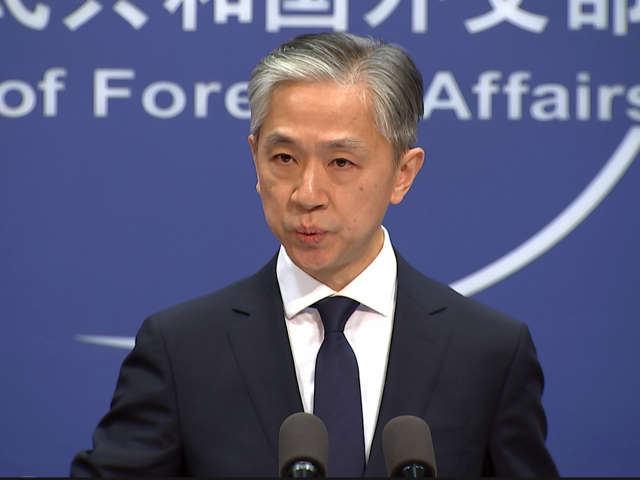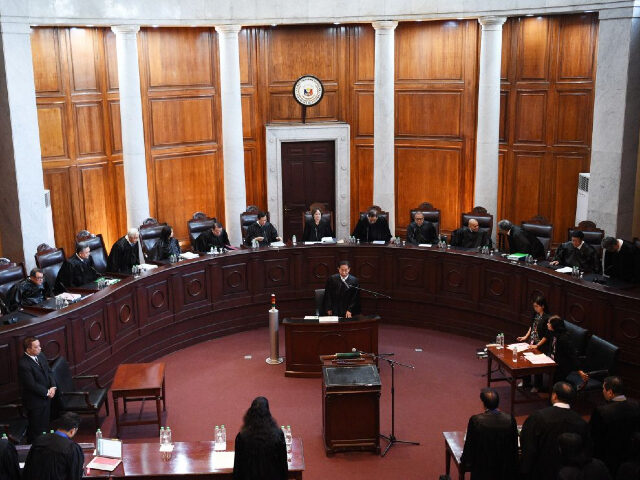The Supreme Court of the Philippines invalidated a 2005 agreement on Tuesday between the Philippines, Vietnam, and China that would have allowed a Chinese government corporation to explore for oil in Filipino waters, unconstitutionally exploiting the country’s national resources.
The 2005 deal, known formally as the Tripartite Agreement for Joint Marine Seismic Undertaking (JMSU) was signed under China-friendly President Gloria Macapagal-Arroyo and allowed China, and Vietnam, into Philippine waters to seek crude oil – thus, the court concluded, offering illegal access to foreign countries to reserves that belong to the Filipino people. The area to be jointly explored would have been in disputed waters of the South China Sea belonging to the Philippines that China has spent much of the past decade invading and attempting to colonize.
While the signers of the agreement touted it as an attempt to develop joint resources belonging to all three nations, about 80 percent of the territory in question falls within the Philippines maritime border, according to the Philippine Inquirer.
China claims the vast majority of the South China Sea behind a false maritime border known as the “nine-dash line.” The line cuts into the legal territory of the Philippines as well as Vietnam, Brunei, Malaysia, Taiwan, and waters off the coast of Indonesia, causing tremendous diplomatic strain in the region. To assert its dominance in the sea, China has invested in building artificial islands – particularly in Vietnam and the Philippines’ Paracel and Spratly Islands – then equipping them with military faculties, essentially creating floating military bases on what used to be reefs and atolls. The buildup, ecologists have warned for years, is causing irreparable economic devastation to the wildlife that inhabits the area.
The Permanent Court of Arbitration at the Hague ruled China’s “nine-dash line” violated international law in 2016. China has entirely ignored that decision, however, and the Philippines, which brought the case to the court, has refused to enforce it.
While many in Philippine politics are heralding Supreme Court’s decision as a victory for the country’s sovereignty, the Supreme Court acted shortly after newly inaugurated President Ferdinand “Bongbong” Marcos, Jr., visited Beijing and signed a host of other trade and political agreements with the Chinese Communist Party. Macapagal-Arroyo came with Marcos to Beijing to greet old friend Xi.
The decision is likely to outrage the Communist Party and potentially trigger more belligerent activity in the region. The Chinese Foreign Ministry responded tepidly, however, to the decision on Wednesday.
The Supreme Court announced its decision in a press release on Tuesday but has yet to publish the full legal document at press time. It detailed that 12 of the 15 judges voted to void the JMSU on the grounds that violated constitutional provisions preventing foreign actors from profiting off of Philippine resources. The court took 14 years to decide the case.
“The Court ruled that the JSMU is unconstitutional for allowing wholly-owned foreign corporations to participate in the exploration of the country‟s natural resources without observing the safeguards provided in Section 2, Article XII of the 1987 Constitution,” the press release stated.
That article, as quoted by the Philippine Star, specifically lists oil alongside a wide variety of natural resources and wildlife as off-limits to foreigners.
“The exploration, development, and utilization of natural resources shall be under the full control and supervision of the State,” the constitution reads.
The Court rejected the argument that the JMSU only allowed China and Vietnam to participate in “pre-exploration” activities, contending that searching for oil deposits is, on its face, “exploration,” as the constitution intended to define it.
“That the Parties designated the joint research as a ‘pre- exploration activity’ is of no moment,” a snippet of the decision published on Tuesday read. “Such designation does not detract from the fact that the intent and aim of the agreement is to discover petroleum which is tantamount to ‘exploration.'”
Chinese Foreign Ministry spokesman Wang Wenbin did not condemn the Supreme Court decision in his remarks Wednesday, instead mildly lamenting it and expressing a willingness on the part of the Communist Party to draft another similar agreement in the future.

Chinese foreign ministry spokesman, Wang Wenbin, speaks during a routine press conference where he congratulated U.S. president-elect Joe Biden at the foreign ministry in Beijing on Friday, Nov. 13, 2020. China on Friday became one of the last major countries to congratulate Joe Biden on being elected U.S. president. (AP Photo/Liu Zheng)
“It played an important role in promoting stability, cooperation and development in the region,” Wang said of the agreement. “China remains committed to properly handle maritime disputes in the South China Sea with countries directly concerned, including the Philippines, through dialogue and consultation, and to actively explore ways for practical maritime cooperation including joint exploration.”
“During Philippine President Marcos’s recent visit to China, the two sides agreed to bear in mind the spirit of the Memorandum of Understanding on Cooperation on Oil and Gas Development signed in 2018,” he concluded, “and resume discussions on oil and gas development at an early date, building upon the outcomes of the previous talks, with a view of benefiting the two countries and their peoples.”
Joint exploration to find undeveloped natural resources played a significant role, as Wang noted, in Marcos’ visit this month to Beijing. Marcos, with Macapagal-Arroyo in tow, reportedly signed over a dozen economic, infrastructure, and tourism agreements with dictator Xi Jinping. Xi reportedly “proposed” joint oil exploration, but the two leaders did not sign any concrete deals on the matter.
Any such joint exploration operation would now likely face significant legal pushback in the Philippines, given the Supreme Court precedent established on Tuesday.

COMMENTS
Please let us know if you're having issues with commenting.